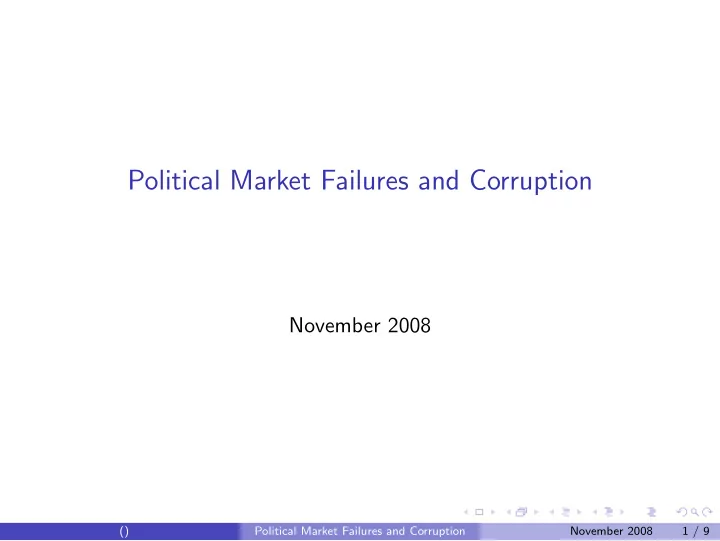

Political Market Failures and Corruption November 2008 () Political Market Failures and Corruption November 2008 1 / 9
When Does Political Competition Lead to Optimal Provision of Public Goods? Political economy models predict that policy in a competitive democracy will reflect the median voter preferences (Median Voter Theorem). In other words, the preferences of voters always translate into actual government policy Puzzle: Why many countries severely under-provide social services, even though in these countries the poor are the median voters! Why is electoral outcome not efficient in disciplining the politicians through selection or sanction? Who determines policy: median voters, or those who have the political power Assumptions behind MVT: All electoral promises are credible; politicians are office-motivated; voters are identical; and voters can observe at no cost the contribution that politicians make to their welfare () Political Market Failures and Corruption November 2008 2 / 9
Democracy and the poor! One approach - Keefer and Khemani (2003): Imperfections in the political market distort political incentives to serve the poor ◮ Lack of information among voters about politician performance - makes it difficult for voters to assign credit or blame, and thus increases political incentives and scope for rent-seeking. e.g. education and health, recent and visible ◮ Social fragmentation among voters manifested as identity-based voting - when ideological polarization along non-economic dimensions (such as religion or ethnic identity) is severe enough, politicians’ performance is irrelevant ◮ Lack of credibility of political promises to citizens - credibility of campaign promises depends on the reputations of candidates and political parties. Such reputations are weak in young democracies () Political Market Failures and Corruption November 2008 3 / 9
Failure of political accountability In countries with weak and non-credible political parties, politicians can still make credible promises to some voters who have personal ties to the candidate - “patron-client” relationship This gives rise to “pork-barrel” or targetable spending at the expense of broad, universal goods () Political Market Failures and Corruption November 2008 4 / 9
Corruption: Constraint on development What features of low income countries make them more susceptible to corruption? Corruption is typically defined as the use of public office for private ends. Is the cause preferences, low income or the different roles of governments in rich and poor countries Bureaucratic Corruption: a simple model of how underdevelopment and corruption may be linked (Banerjee) The government delegates service delivery to agents. Leads to an agency problem where the agent seeks to maximize profits How does red tape emerge and is it a guise for corruption? Red tape: complex rules and regulations that give bureaucrats a pretext to extract bribes Some evidence on this (Bertrand, Djankov, Mullainathan and Hanna) Driving licenses in India: does corruption grease the wheels? () Political Market Failures and Corruption November 2008 5 / 9
Evidence on which institutions matter Fujimori’s secret-police chief Torres ran Peruvian economy and methodically bribed judges, politicians and media Lima prosecutor’s office estimates that Fujimori’s government appropriated US $600 million He kept meticulous records and videotaped his negotiations McMillan and Zoido: use these bribe receipts and videotapes to quantify the price of various checks and balances The cost of bribing the politicians to get a majority was US $300,000 per month The total cost of bribing judges was US $250,000 per month The total cost of bribing the television channels was over US $ 3 million per month Why was television so expensive? () Political Market Failures and Corruption November 2008 6 / 9
Political Corruption in developing countries How does the political process control opportunistic behavior (corruption) by elected officials? Depends on the motivations of politicians Politicians may not be solely office-motivated, but have personal policy preferences (Citizen-candidate approach) Politicians’ policy preferences are informative of policy outcomes, and voters take these into account Corrupt politicians can still get elected () Political Market Failures and Corruption November 2008 7 / 9
Why do corrupt politicians still get elected? Myerson (1993): if voters choose candidates on the basis of their policy preferences, then a coordination failure across voters may imply that the least corrupt candidate is not selected. Voters continue to vote for the relatively corrupt candidate as they are concerned that if they vote differently then the least preferred candidate may win Banerjee and Pande (2006): the least corrupt candidate may not be selected if his policy preferences do not match those of the majority population group. e.g. politicians belonging to the historically socio-economically disadvantaged groups are likely to favor transfers to the poor, but being poor themselves, are also more likely enrich themselves () Political Market Failures and Corruption November 2008 8 / 9
Policy Implications Corruption: if the person who makes the rules can be corrupt then we need external institutions (electoral, international..) to reduce it Reforms that target the underlying political market failures are likely to be more effective - decentralization, participatory budgeting etc. Mechanisms for building reputation for performance - development of political parties and other political institutions Information campaigns Politician selection procedures may have significant implications for policy outcomes Political selection may systematically be biased in favor of certain groups the traditional elite, the rich .. Policy solution: Mandated political representation () Political Market Failures and Corruption November 2008 9 / 9
Recommend
More recommend